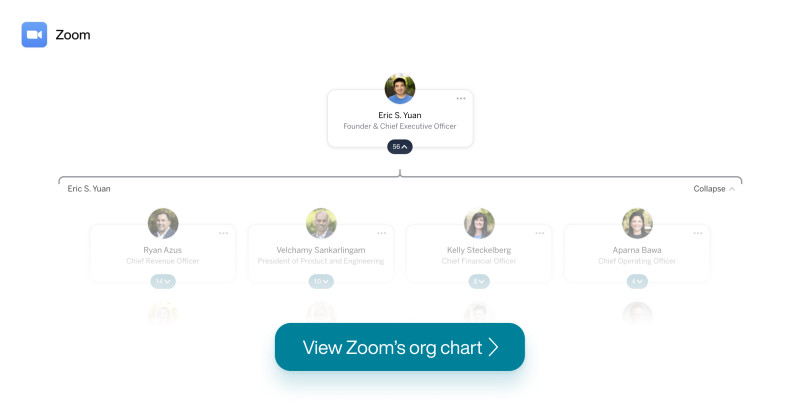- Iterate
- Meet The Team
- Zoom Hires New Cybersecurity Chief – Meet the Power Players Leading Zoom
Zoom Hires New Cybersecurity Chief – Meet the Power Players Leading Zoom
The Org has identified the most influential people behind the scenes at videoconferencing platform Zoom. Here’s our exclusive org chart of the top executives and their roles.

Zoom has hired a new information security chief in its latest move as it nears the end of a 90-day plan announced in April to tackle the security and privacy challenges that surfaced as usage of its platform skyrocketed during the coronavirus lockdowns.
Cybersecurity veteran Jason Lee, who, until recently, was Salesforce’s senior vice president of security operations, joins Zoom as its new chief information security officer on June 29. Prior to Salesforce, Lee worked at Microsoft for 15 years in various roles, including as principal director of security engineering for its Windows and Devices division, a key area for the company.
He replaces Zoom’s previous CISO, Richard Farley, who is now head of cyber security operations according to his LinkedIn profile. Lee will be tasked with leading Zoom’s security team and report to Aparna Bawa, Zoom’s chief operating officer.
During the 90-day period, the company bolstered its executive team with both new hires in the areas of security and privacy and internal promotions of key employees. Lee joins the team as the company exits this period on July 1, and together with Zoom’s key executives, focuses on the path towards making Zoom the most secure and easy-to-use communications platform for its users.
Zoom is led by founder and chief executive Eric Yuan, who has been thrust into the spotlight as the product’s security shortcomings made headlines, including controversies over the level of encryption provided to users and “Zoombombing” incidents where hackers and online trolls disrupted meetings to share pornography or hate speech. The company acted quickly to address the major issues releasing an update in late April. This month, Zoom took a big step announcing that it would provide end-to-end encryption to all of its users starting with a beta version in July.
Yuan’s journey in creating Zoom started in 1997 when he joined web-conferencing startup WebEx as an engineer. The company was acquired by Cisco in 2007 for $3.2 billion, and Yuan remained with the company for four more years. He left Cisco Webex in 2011 with the goal of creating a simpler and better WebEx after becoming disillusioned with the quality of the service while working at Cisco.
The leadership team at Zoom is filled with WebEx veterans, including Oded Gal who joined Zoom in March 2016 as chief product officer. Gal works alongside Yuan leading Zoom’s product strategy and reportedly shares an office with him at Zoom’s headquarters.
Kelly Steckelberg, the company’s chief financial officer, previously worked with Yuan at WebEx and Cisco, and joined Zoom in 2017 from online dating service Zoosk, where she was the CEO. Another former colleague, Janine Pelosi, spent over 10 years in marketing at WebEx and Cisco prior to joining Zoom in 2015 as its first head of marketing and now its chief marketing officer. The most recent WebEx veteran to join is Ryan Azus, who became Zoom’s chief revenue officer in August 2019, a few months after its IPO.
While Zoom already had new hiring in the works before the coronavirus outbreak, the unexpected explosion in growth has both accelerated and expanded its hiring plans, especially in areas that impact the security and privacy of its product.
Last week, cloud veteran Velchamy Sankarlingam, who worked alongside Yuan as an engineer at WebEx, joined Zoom’s leadership team as president of engineering and product. Sankarlingam was most recently an executive at VMware where he spent a decade. His arrival follows Zoom’s announcement in May of plans to expand its tech team with up to 500 new software engineers in the next few years based in Phoenix, AZ and Pittsburgh, PA.
With regulators in the U.S. and Europe circling around its data privacy practices, Zoom hired Jonathan “Josh” Kallmer, formerly the executive vice president for policy at the Information Technology Industry Council, in May as its head of global policy and government relations. Kallmer's appointment comes as Zoom has also drawn the attention of lawmakers over its ties to China where it has about 700 engineers, according to its recent SEC filings.
Given that Zoom is under more scrutiny than ever before, Yuan is spending most of his time focusing on security and privacy issues. He’s acknowledged that Zoom was built primarily for businesses rather than the masses, and has apologized for the security and privacy lapses not having anticipated that Zoom would become an essential service during a time of social distancing.
One of the major measures the company has undertaken as part of its 90-day security plan is to strengthen its security and privacy team by hiring a number of well-known security consultants. It brought in former Facebook security chief Alex Stamos as an advisor to manage the effort. Other high-profile names that have joined Zoom as outside experts include privacy expert Lea Kissner, who formerly headed Google’s privacy technology, and Matthew Green, a noted cryptographer and John Hopkins University professor.
A key milestone in Zoom’s 90-day plan was the acquisition of security startup Keybase in early May to help bolster its encryption capabilities. Keybase co-founder and CEO Max Krohn now leads Zoom’s security engineering team, reporting to Yuan. The acquisition added Keybase’s roughly two dozen security and encryption engineers to the Zoom team.
The company has also promoted a few members of its executive team to meet its new challenges. Its chief legal officer, Aparna Bawa, who joined Zoom in 2018 after in-house legal stints at Magento Commerce, Nimble Storage and Inphi Corp., was elevated to the newly-created chief operating officer position at the end of May. The company is currently searching for a new general counsel who will report to Bawa.
Brendan Ittelson, who has led Zoom’s global customer support for the past five years, was promoted in April to the C-suite as chief technology officer. In his new role, Ittelson leads technology strategy and innovation, and is charged with creating and executing Zoom’s technical vision.
In the wake of protests over racism and police violence following the police killing of George Floyd, Zoom tapped Damien Hooper-Campbell as its first chief diversity officer at the beginning of June. He will lead the creation of the company’s global diversity and inclusion program, which will focus on both employees and its products. Prior to joining Zoom, Hooper-Campbell was eBay’s first chief diversity officer.
As the economy gradually reopens and with its larger tech rivals racing to capture some of its momentum, it remains to be seen if Zoom can maintain its newfound position as the world’s most popular video-conferencing company.
For now, Yuan and his team are working around the clock to rectify the issues that have plagued Zoom vowing to win back the trust of its users. While its platform was built primarily for business customers, the COVID-19 pandemic has forever changed the way the product is used by a much broader consumer base. Looking ahead, Zoom will emerge from its months-long improvement plan with a service that is more secure and better for all of its users, no matter if it’s a large company or an individual user.
--
Is your org chart up to date? Visit The Org to show off your team to the world and attract new talent!
In this article


The ORG helps
you hire great
candidates
Free to use – try today
